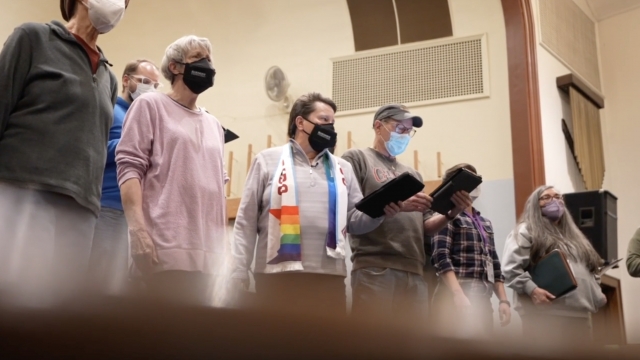Recently, there was another mass shooting at an LGBTQ+ nightclub called Club Q in Colorado Springs. Coverage of the incident was front and center for days, but when the focus turns to the next big story, the grieving doesn't stop for these communities.
Singing in a room is more than creating a tune: breathing in the reality of the world around them and exhaling the emotions that come with it. As a member of the LGBTQ+ choir Harmony, Lisa Sisneros says those emotional, musical opportunities are crucial to her wellbeing and they have been for most of her adult life.
"It gives me a chance to show some emotions that I might not otherwise show," Sisneros said. "In a lot of ways harmony made it possible to say 'I don't care what anybody thinks.' And eventually through singing with harmony I got to a place where I could come out to my family, not worrying whether I would lose my family."
LGBTQ+ choirs were originally created out of tragedy dating back to the AIDS crisis. For years, they have continued to serve as a place of safety and healing for this community.
"I'm a graduate of Columbine High," Sisneros said. "My mother calls me every time there is a mass shooting to see if I'm OK."
When mass shootings like Orlando's Pulse nightclub or Colorado Springs' Club Q happen, we hear about these communities mourning. But it's groups like Harmony, these members say, that help the healing continue when the media spotlight wears off.
"When Pulse happened, it was a shock to all of us," Sisneros said. "It doesn't go away. It affects you forever."
A record-breaking number of murders against trans people occurred in 2020, according to the Human Rights Campaign. 44% of lesbian women have experienced rape, physical violence or stalking by an intimate partner, and 70% of LGBTQ+ members have been sexually harassed at work.
"And when you're in the midst of it and you're trapped in a place like this, you need a place to go where there is no judgment, there is no 'Well if you hadn't been out at the gay bar,'" Sisneros said.
Grief has no guaranteed route and neither does trauma. Music is the thread that helps these singers navigate their personal journeys.
"It gives us a place to just open up and let everything out that we've ever felt," Sisneros said. "We have these traumas from so many other places and only this family really gets the totality of that."
Whether it's pain you are experiencing now, neglect from 20 years ago, or ongoing grief, groups like Harmony are dedicated to serving as a safe space for healing.





